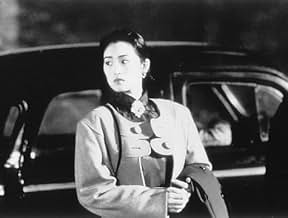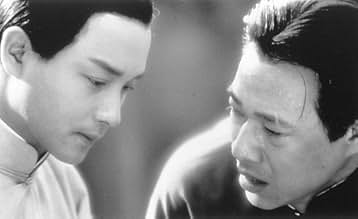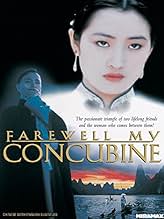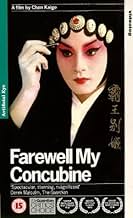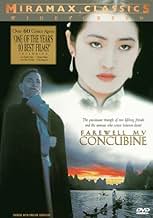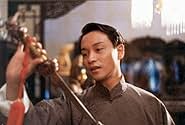Dieyi et Xiaolou, formés depuis l'enfance à l'art de l'opéra de Pékin, occupent désormais le haut de l'affiche. Dieyi, secrètement amoureux de son compère récemment marié, voit leur amitié s... Tout lireDieyi et Xiaolou, formés depuis l'enfance à l'art de l'opéra de Pékin, occupent désormais le haut de l'affiche. Dieyi, secrètement amoureux de son compère récemment marié, voit leur amitié se fragiliser dans un pays en constante évolution.Dieyi et Xiaolou, formés depuis l'enfance à l'art de l'opéra de Pékin, occupent désormais le haut de l'affiche. Dieyi, secrètement amoureux de son compère récemment marié, voit leur amitié se fragiliser dans un pays en constante évolution.
- Nommé pour 2 Oscars
- 24 victoires et 12 nominations au total
- Shitou as a Child
- (as Yang Fei)
Avis à la une
A must see film!!!
Three points make this film outstanding. The first is the technical skill of the director and the luscious taste of the director of photography. The entire film is a feast for the eyes, taking full advantage of elaborate costumes and exotic locations. The second strength is in the actual storytelling. The plot is a fascinating tragedy, it feels almost Shakespearean. The acting is nothing short of incredible. Some of China's finest actors demonstrate their ability to carry a story that covers 52 years. Normally, these two strengths alone would be reason enough to see a film, but "Farewell my Concubine" succeeds in satisfying one more category (the bain of any epic): historical accuracy.
"Farewell my Concubine" is exceptionally accurate in portraying the monumental changes that were sweeping China at the time. The film doesn't just treat these events as background events, but drags them right into the plot and pins the characters into their surroundings. This is interesting when you consider that the story takes place in the Peking Opera, not the most likely place for these events to have effect. Instead, as we see the new China emerge, we watch these vestiges of old society fall, and the work of all involved make this transition an achievement to behold. The power of this film was not missed by Chinese censors who banned, removed, and then banned the film again several times over -debating whether or not its artistic brilliance was worth subversive portrayals of suicide and homosexuality. Unlike "The Last Emperor," this film was made by Chinese film makers and is in tune with its subject. I recommend this film highly!
As one last note, the version I saw was a DVD containing the original 170 minute version of the film, in its wide-screen splendor. From what I understand, the shorter versions released internationally deleted and shortened some opera scenes for fear that they would be lost on Western audiences. Having no prior experience with any Peking Opera, I found the scenes fascinating and integral to appreciating the entire story. Spend the extra time if you can.
It is difficult to figure out what this movie is and if asked to summarise it in 25 words or less I would be flummoxed. Is it a Chinese history movie? An opera movie? A Chinese culture lesson? A love story? A story of betrayal? A story of pseudo or actual homosexuality? It is snippets of all of these and probably more, but it does not really do justice to any of them. Basically it suffers from multiple personality disorder and unfortunately we don't get enough time with any of them to relate to any of them. Yes, the history and cultural aspects are interesting in their way but don't really add anything to our understanding of the horrors of the Japanese invasion of China, the Nationalist/Communist struggle, the early Communist era and the later Cultural Revolution. Yes, it is a "love story" between the two actors who play the King and the Concubine, but we never experience any passion or come anywhere close to connecting to either of these characters to really care. The "King" character in particular is very undeveloped, little more than a cardboard cut-out who happens to be the object of the "Concubine's" unrequited love. The character played by Gong Li is also skin deep and we never really care about her or her relationship with the "King" actor – indeed the random and non-sensical way in which these two characters become engaged simply nukes any credibility that this relationship might have had, and by extension destroys the credibility of any other relationship on the movie, most importantly the pivotal one between the "King" and the "Concubine". The betrayal, which I gather meant something personal to the director, is dealt with too curtly to have any effect at all. The character of the "son", raised from an abandoned baby, is totally illogical and we simply don't get to know him well enough to care about him or understand why he would possibly want to betray his adoptive parents. It all just seems facile and silly. We never really understand (or at least, I don't) the "homosexual" overtones of the "Concubine". Was he simply beaten into a form of insanity in which he thinks he is always in character as a woman? Is he actually a homosexual? His "king" friend seems to be too thick to understand the "Concubine's" feelings for him and this to me trivializes the whole "affair". And to be honest, none of the characters come across as being particularly nice, in fact the Concubine character comes across more as a petty, whinny, jealous, lightweight flake than a tragic figure we could weep for.
OK, just because a film is not perfect doesn't mean you should not watch it. "Farewell My Concubine" is one of those films which is a "must see" despite its failings. If it falters as an emotionally satisfying and coherent movie it is a stunning technical tour de force and a masterpiece of its kind. Just to have made a movie of this scope is an achievement, almost to the point that its success is secondary, crazy as that may sound. It is a movie of such breadth that it is impossible to take in completely in one sitting, and that is perhaps the ultimate test – you know you need to see it again to understand it but can you care enough about it to make that effort? But – trust me - you need to see this movie – your education as a movie goer is incomplete unless you do. You will enjoy it, and you will be moved to have an opinion, one way or the other.
Though often portrayed as haunting and disturbing, it's also quite touching at times... attributed largely to the outstanding emotional performances by the film's lead cast. Hands down, Chen Kaige has directed one of the most beautiful films involving the fall of the great Imperial China... and subsequently... the friendship of two of China's greatest leading opera performers.
Leslie Cheung's role as Cheng Dieyi, the tormented 'concubine' of the story, is absolutely astounding, and is probably one of his greatest performances to date. Fengyi Zhang plays well opposite Cheung, and Gong Li is fantastic as always. The production sets are superb, as are the costumes and cinematography.
Definitely a must see for all fans of foreign cinema, and certainly worthwhile for all newcomers.
10 out of 10
Le saviez-vous
- AnecdotesJackie Chan was originally offered the role of Duan Xiaolou due to his own childhood experience of training in the Peking Opera. But he turned it down, fearing that the film, which deals with themes of homosexuality, might tarnish his image.
- GaffesWhen Douzi is first examined by the owner of the opera troupe, his extra finger is on his right hand below the thumb. When he withdraws the hand from the opera troupe owner, he pulls back his left arm. When his mother cuts the extra finger off a few moments later, it is now on his left hand, next to his pinkie.
- Citations
Master Yuan: A smile ushers in the spring.
Master Yuan: A tear does darken all the world.
Master Yuan: How truly does this befit you. To you... only you are possessed of such charm.
- Versions alternativesThe version presented in the U.S. is different from the original, longer cut, that was distributed internationally. The following differences exist in the U.S. version:
- The scene where Duan and Juxian are drinking after their wedding was originally directly after the wedding scene, rather than after the bloodletting at the Yuan-Cheng dinner.
Meilleurs choix
- How long is Farewell My Concubine?Alimenté par Alexa
Détails
Box-office
- Budget
- 4 000 000 $US (estimé)
- Montant brut aux États-Unis et au Canada
- 5 549 086 $US
- Week-end de sortie aux États-Unis et au Canada
- 69 408 $US
- 17 oct. 1993
- Montant brut mondial
- 7 437 725 $US
- Durée2 heures 51 minutes
- Couleur
- Mixage
- Rapport de forme
- 1.85 : 1
Contribuer à cette page



